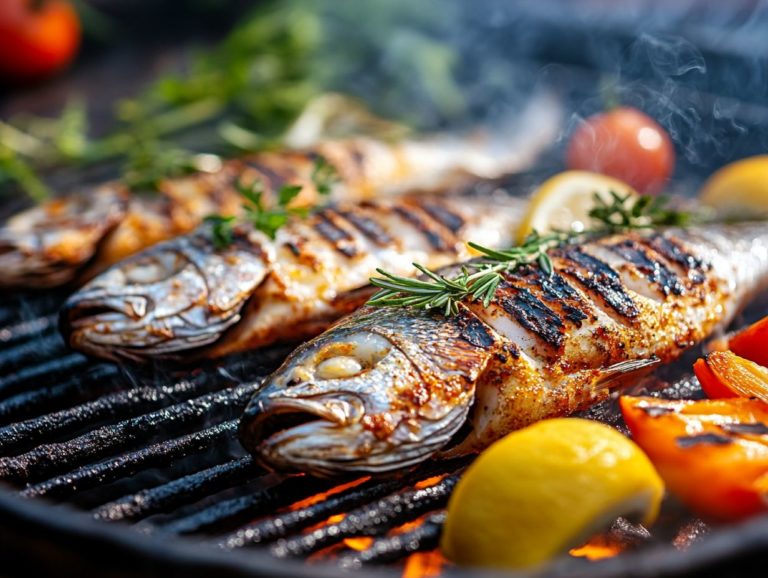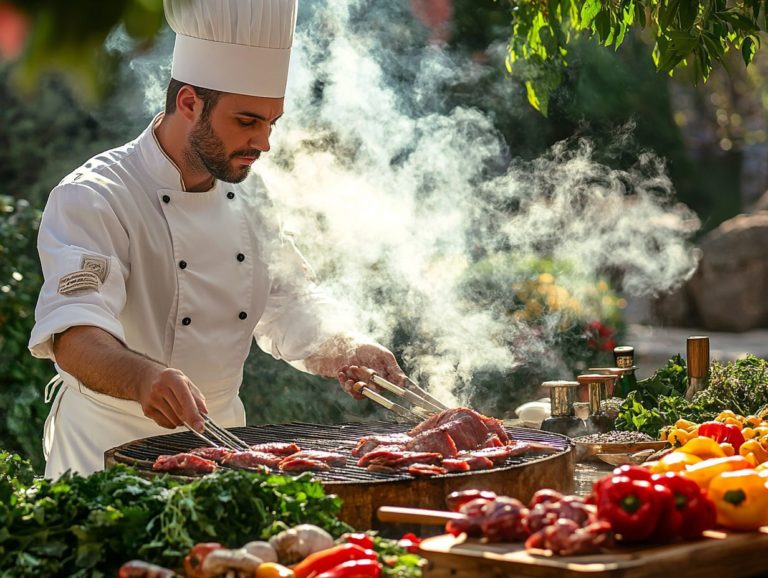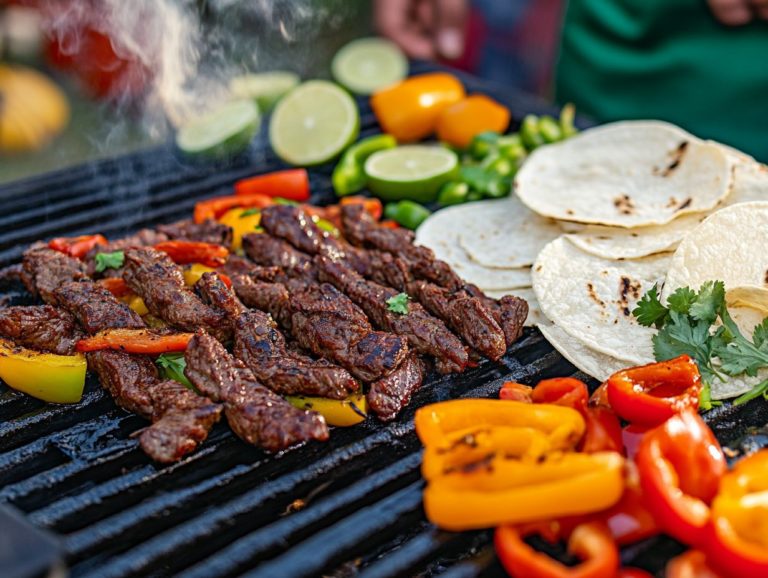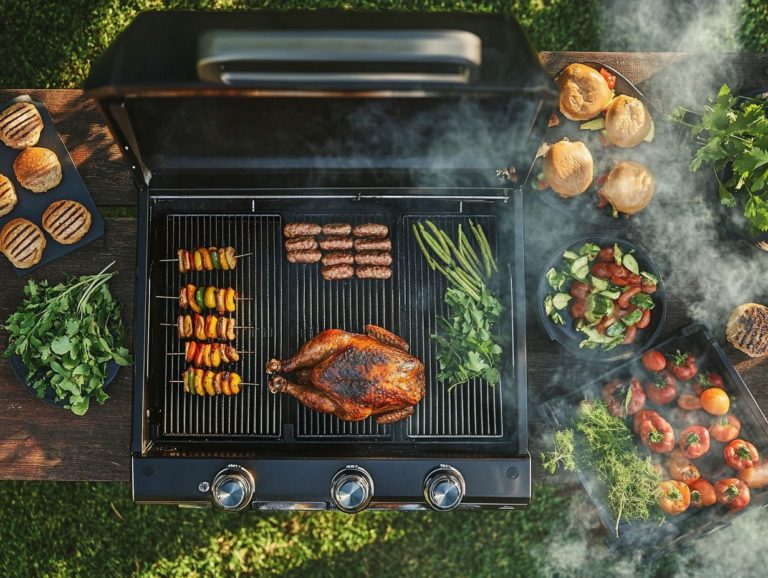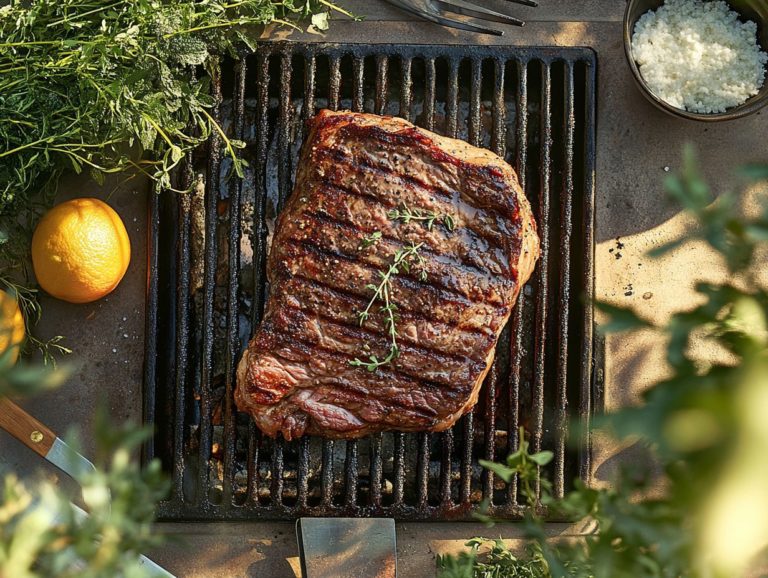Grilling Fish: Best Practices for Perfect Results
Grilling fish isn t just a delicious way to prepare seafood; it also unlocks unique flavors that can elevate any summer barbecue to new heights.
This exploration highlights the many benefits of grilling fish, covering everything from its health advantages to the delightful taste it brings to your table. You ll discover how to choose the best types of fish for grilling, along with expert tips on marinating and seasoning.
Essential grilling techniques will also be discussed to help you achieve perfect results every time.
We ll walk you through common mistakes to avoid and suggest fantastic side dishes and sauces that will perfectly complement your grilled masterpiece.
Prepare to fire up the grill and impress your guests with your seafood grilling skills!
Contents
Key Takeaways:
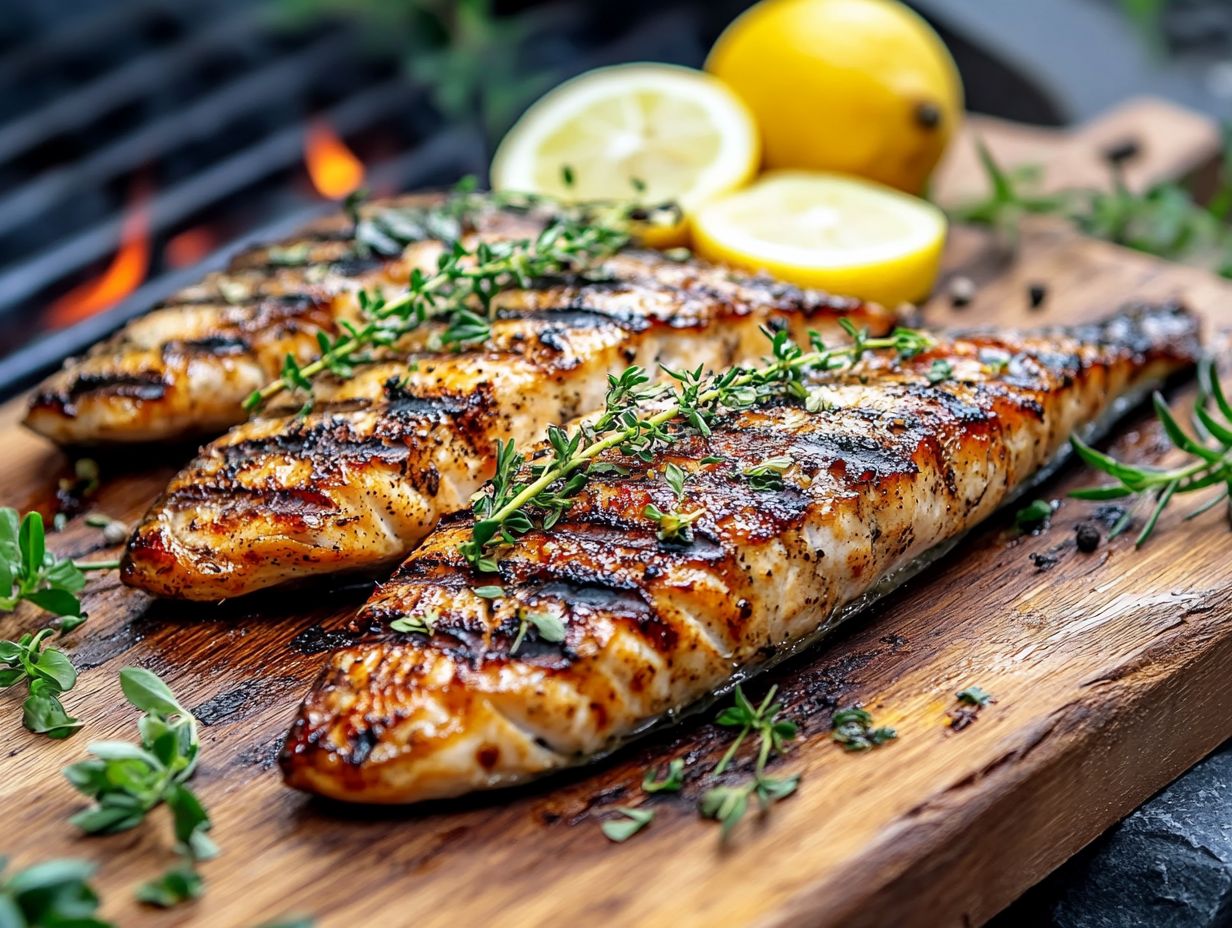
- Grilling fish is a healthy and delicious cooking method that brings out the natural flavors.
- Choose firm and oily varieties like salmon, tuna, and swordfish for the best grilling results.
- Marinate with acidic ingredients and use direct heat for thin fish and indirect heat for thicker cuts.
Benefits of Grilling Fish
Grilling fish is not just a tasty way to savor the ocean’s bounty; it also brings a host of health benefits while enhancing the flavors of different fish varieties. The high heat of grilling seals in moisture, creating a delightful crispy exterior while keeping the inside tender and flaky.
Whether you’re grilling salmon fillets, sea bass, or even swordfish, this technique offers an enriching experience that takes your summer barbecue to the next level. Choosing sustainable practices when sourcing fresh seafood supports the environment and ensures that you serve the finest quality fish.
Why Grilling is a Great Cooking Method for Fish
Grilling enhances the flavors of fish while preserving how healthy it is a truly excellent choice for a healthy protein source. When you apply high heat, it caramelizes the natural sugars in the fish, creating a delightful crust that elevates the taste experience.
This technique not only deepens the fish’s flavor but also locks in moisture, ensuring a tender, flaky result that bursts with taste. Grilling also preserves essential nutrients, such as omega-3 fatty acids, a type of fat that s good for your heart.
Fish like salmon, sea bass, and trout are particularly suited for grilling, thanks to their firm texture that withstands heat. This allows the fish to adopt a deliciously smoky aroma that beautifully complements its inherent flavors.
Choosing the Right Fish for Grilling
Selecting the perfect fish for grilling is essential for crafting a memorable culinary experience. Different fish varieties bring distinct flavors and textures that can elevate your summer barbecue.
Consider popular options like salmon, halibut, and swordfish, all of which excel on the grill. Tuna and sea bass are equally impressive when kissed by an open flame.
Take a trip to your local seafood counter to discover the freshest selections, and don’t overlook seasonal variations that can enhance your grilling repertoire.
Best Types of Fish for Grilling and Seasonal Variations
When choosing the best types of fish for grilling, you can’t go wrong with salmon fillets. Their rich flavor and high-fat content help keep them wonderfully moist as they sizzle on the grill.
But don t stop there there are plenty of other fantastic options to explore. Tuna steaks, for instance, offer a robust texture and a delightful taste that truly shines when seared over high heat.
Then there’s swordfish, boasting a firm texture that stands up perfectly on the grill, making it an excellent choice for kebabs. Keep in mind that seasonal variations play a significant role in the availability and flavor profiles of these fish.
Certain species are best enjoyed fresh during specific months. In the warmer seasons, you might reach for crustaceans like crab and lobster, which are always popular on the grill. And don t overlook tilapia; it provides a milder alternative year-round, easily adapting to various marinades and seasonings.
Preparing Fish for Grilling
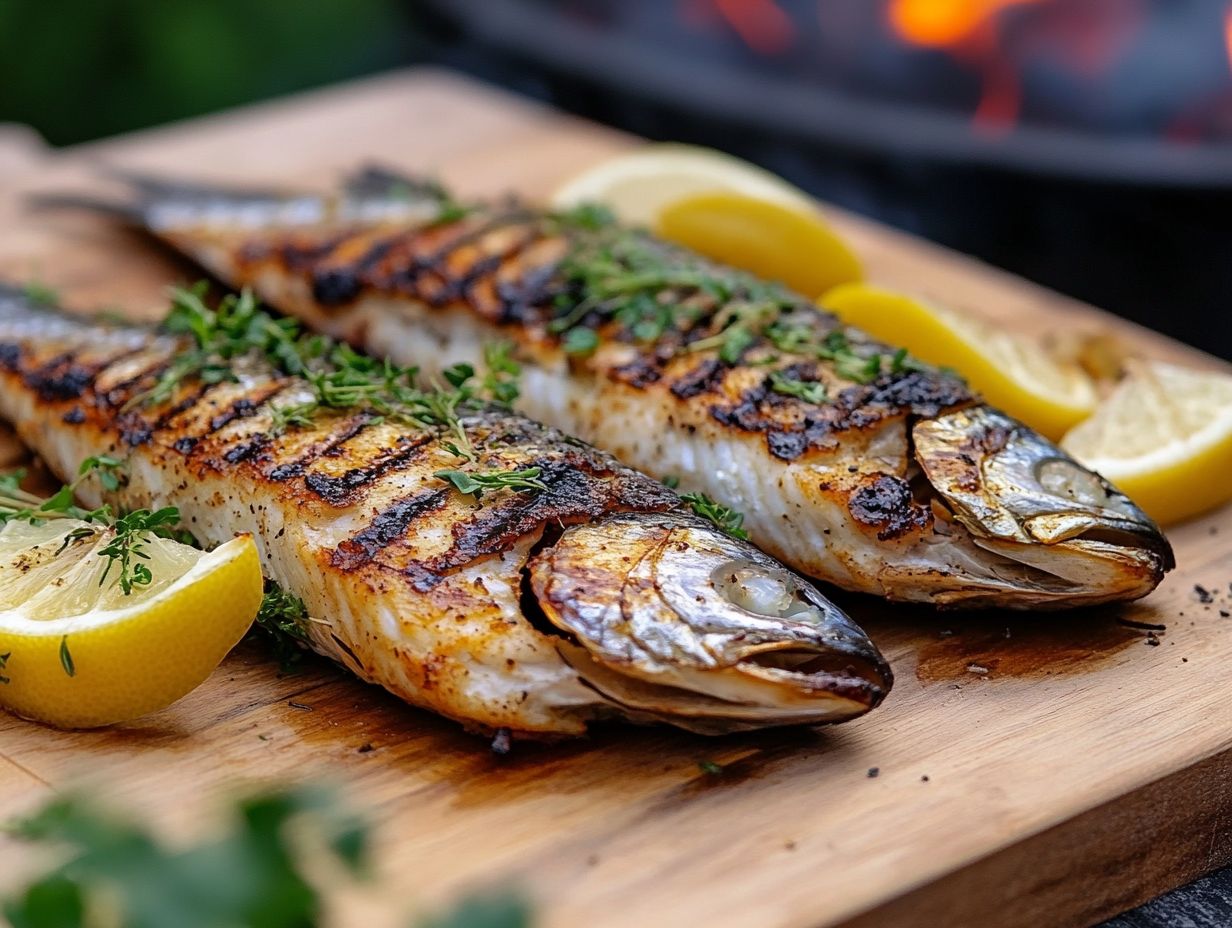
Preparing fish for grilling is essential. Effective marinating and seasoning techniques are crucial. They greatly enhance the fish’s flavor and texture.
Coating the fish with olive oil prevents it from sticking and imparts a delightful richness. A marinade with lemon butter adds a zesty kick that beautifully complements the fish’s natural flavors.
With thoughtful preparation, your grilled fish can be delicious and a feast for the eyes.
Marinating and Seasoning Techniques
Marinating fish before grilling elevates its taste. Incorporate ingredients like olive oil and lemon butter to enhance both taste and moisture.
Finding a balanced ratio of oil to acid is crucial. Start with three parts oil to one part acid for best results. For example, a marinade with soy sauce and sesame oil pairs beautifully with salmon. A vibrant mix of lime juice and cilantro works magic with delicate white fish like tilapia.
Allow the fish to marinate for at least 30 minutes to soak in those flavors. However, do not exceed two hours; an extended soak can lead to a mushy texture. Make sure your grill is preheated for optimal searing. This locks in moisture and helps prevent sticking, guaranteeing a delightful dining experience.
Grilling Techniques for Perfect Results
Mastering grilling techniques is vital for achieving impeccable results when cooking fish. Understanding the nuances between direct and indirect heat will profoundly influence your dish.
Direct heat is perfect for thinner fish fillets. In contrast, thicker options like fish steaks thrive under indirect heat, ensuring even cooking without drying out. Familiarizing yourself with the appropriate cooking times for different fish varieties empowers you to serve a flawlessly grilled meal every time.
Direct vs. Indirect Heat and Cooking Times
Grasping the nuances of direct versus indirect heat is essential for reaching the perfect cooking temperature and texture. This ensures your dish is both exquisite and safe to enjoy.
Fatty fish like salmon or trout thrive under direct heat. This allows the exterior to achieve crispiness while keeping the inside tender and juicy. Aim to grill these varieties at a medium-high temperature, around 375-400 F.
On the flip side, leaner fish like cod or halibut should be cooked using indirect heat at lower temperatures typically around 325 F to prevent drying out.
To determine doneness, use a digital thermometer. Fish should reach an internal temperature of 145 F. Adjust cooking times based on the thickness of the fillet to ensure even cooking without risking overcooking.
Tips for Avoiding Common Grilling Mistakes
Avoiding common grilling mistakes is essential for achieving perfectly cooked, flavorful fish. To ensure success, consider these tips for grilling seafood, as minor oversights can lead to sticking or overcooking, which can compromise your dish.
Unlock the secrets to perfect grilling with tips like preheating the grill, oiling the grates, and carefully monitoring cooking time. These steps will help you sidestep pitfalls and serve a beautifully grilled meal that impresses everyone at the table.
Preventing Sticking and Overcooking
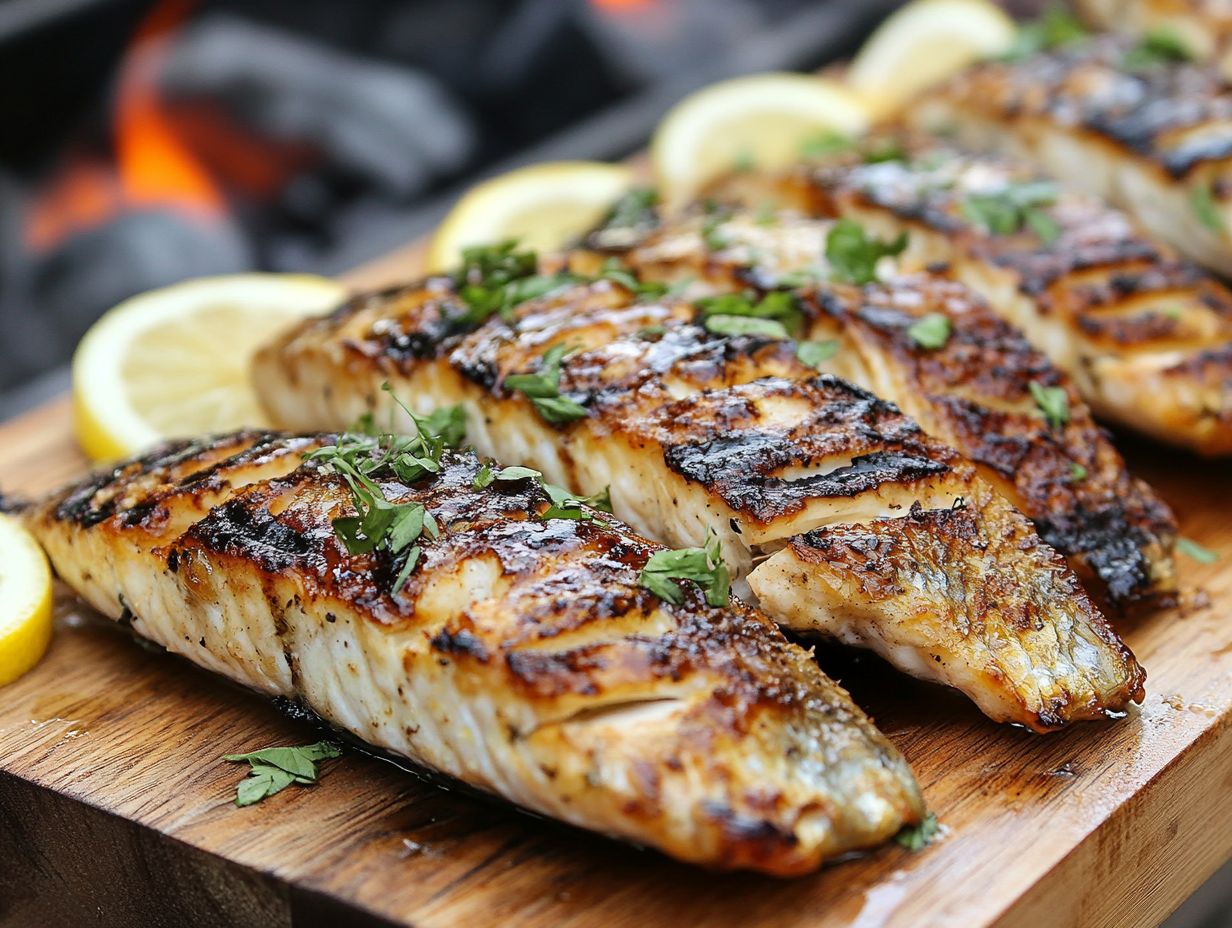
Preventing sticking and overcooking is paramount when grilling fish. These issues can greatly compromise the texture and flavor of your dish.
To achieve perfectly grilled fish, start with the right grilling surface and techniques. For those new to grilling, exploring the best grilling techniques for beginners can be invaluable. Applying a generous amount of oil creates a barrier between the fish and the grate, significantly reducing the chances of sticking.
Using a fish basket or wrapping the fish in foil can make flipping effortless while preserving its juiciness. Monitoring cooking times and temperatures is crucial; a meat thermometer can become your best ally.
This ensures the fish reaches the ideal internal temperature without drying out. Aim for around 145 F for optimal results and always consult suggested cooking times based on the thickness of your fillet.
This careful approach will reward you with a delicious, perfectly cooked dish that you can truly take pride in.
Serving and Pairing Grilled Fish
Serving and pairing grilled fish with complementary side dishes and sauces can elevate your summer barbecue experience. This creates a harmonious balance of flavors that delights the senses.
Try classic choices like grilled vegetables, rice, or a fresh salad; these options refresh your palate against the rich flavors of grilled fish.
Meanwhile, sauces such as lemon butter or mango salsa transform your dish, enhancing the overall flavor and making your meal unforgettable!
Complementary Side Dishes and Sauces
Choosing the right side dishes and sauces is essential for enhancing your dining experience and turning your meal into something truly memorable.
Picture this: the rich, smoky flavor of grilled salmon perfectly complemented by a vibrant mango salsa that brings its natural taste to life.
Or consider a zesty lemon-dill sauce drizzled over grilled trout, accentuating its delicate texture with every bite.
Seasonal ingredients, such as fresh asparagus or grilled zucchini, make for ideal accompaniments. They add a pop of color and a satisfying crunch to your plate.
A light quinoa salad tossed with cherry tomatoes and cucumbers can elevate your meal further. It provides a refreshing contrast that balances the richness of the fish.
As summer unfolds, think about incorporating peaches or heirloom tomatoes into your sides! Not only will they brighten your dish, but they’ll also create a delightful harmony of flavors.
Frequently Asked Questions
What type of fish is best for grilling?
Firm, meaty fish such as salmon, tuna, swordfish, and halibut are best for grilling. These types of fish hold up well on the grill and retain their moisture and flavor.
Should I marinate the fish before grilling?
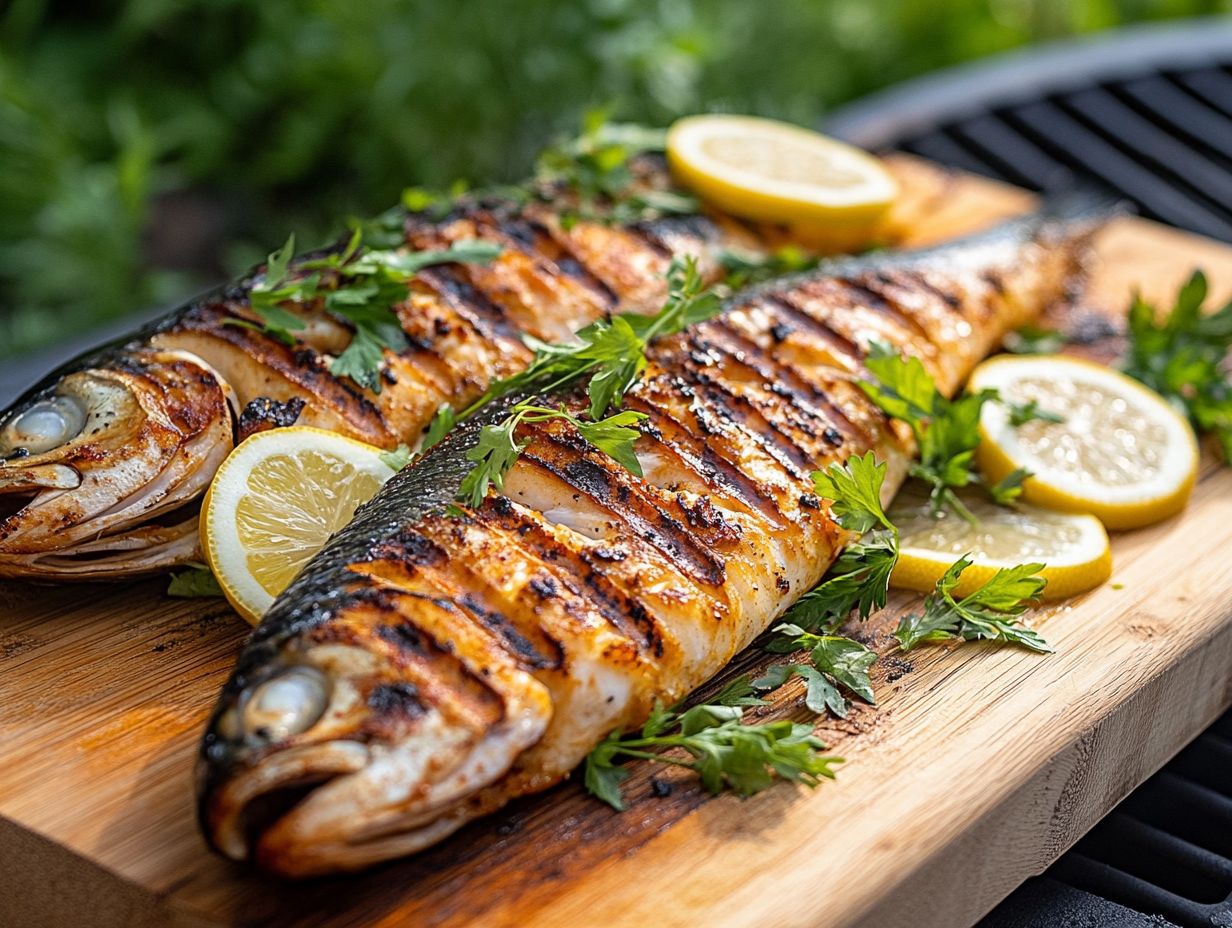
Yes, marinating fish before grilling adds flavor and helps keep it moist. A simple marinade of olive oil, lemon juice, and herbs is a great option!
How do I prevent the fish from sticking to the grill?
To prevent fish from sticking to the grill, make sure the grill is clean and well-oiled before cooking. You can also place the fish on a sheet of aluminum foil or use a grilling basket.
What temperature should the grill be set to for grilling fish?
The ideal temperature for grilling fish is between 350-400 degrees Fahrenheit. This allows the fish to cook evenly and prevents it from overcooking.
How do I know when the fish is done cooking?
The fish is done cooking when it flakes easily with a fork and reaches an internal temperature of 145 degrees Fahrenheit. Avoid overcooking the fish, as it will become dry and lose its flavor.
How can I add a smoky flavor to grilled fish?
You can add a smoky flavor to grilled fish by using hardwood chips, such as hickory or mesquite, in a smoker box or by using a charcoal grill. Soak the wood chips in water for 30 minutes before grilling, then add them to the coals or smoker box for a delicious smoky taste.

